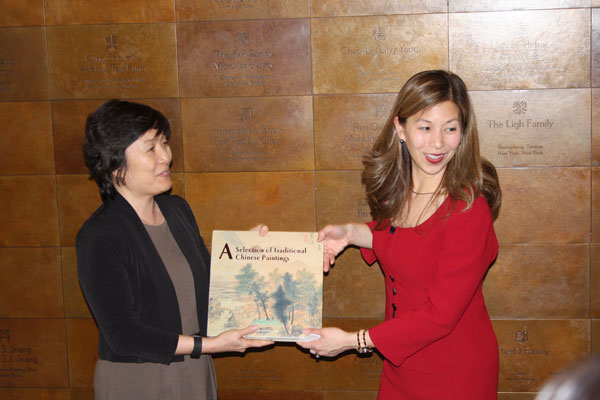A day for centenarians at MOCA
By JACK FREIFELDER and NIU YUE in New York (China Daily USA) Updated: 2015-04-17 11:32
 |
|
Zhang Qiyue (left), the Chinese consul general in New York, and Nancy Yao Maasbach (right), president of the Museum of Chinese in America (MOCA) exchange gifts on Thursday in Downtown Manhattan. Zhang was on hand to tour the museum's latest exhibit: Water to Paper, Paint to Sky: The Art of Tyrus Wong. The exhibit is the first full-scale retrospective of Wong's work in New York (he is a 104-year old transplant from Guangdong province), and it will run through Sept 13. Jack Freifelder / China Daily |
Maude Pettus, a 101-year-old self-proclaimed China lover, helped treat the wounded in fighting between China and Japan during World War II.
On Thursday, Pettus' service was recognized by Zhang Qiyue, China's consul general in New York, and Nancy Yao Maasbach, the president of the Museum of Chinese in America (MOCA).
The museum hosted a discussion of the book, Ten Good Years, by Linda Bordner, which chronicles Pettus' time in China.
"By knowing the history between Chinese and Americans, we can further promote this relationship," Zhang said. "It's time to recall a bit of the history, but also to look toward the future.
Pettus wasn't the only centenarian being celebrated at MOCA.
Zhang also stopped by to view the exhibit Water to Paper, Paint to Sky: The Art of Tyrus Wong. At 104 years old, Wong is the oldest Chinese-American artist alive.
In the 1940s, Pettus served as the head nurse at the Xiangya Hospital in Changsha, Hunan province, one of the institutions that the Yale-China Association helped establish. Serving alongside her husband Winston Pettus, a surgeon, the duo worked to help those wounded during the war.
"I've had to face downs as well as ups, but I have loved China since I was born," Pettus said.
The Yale-China Association, founded in 1901, works to promote cultural and educational exchanges between China and the United States. Maasbach was a former executive director of the group.
Maasbach said that Pettus is an example of how people not born in China can still feel close ties to the country.
"Chinese culture, as we define it, is distinct," Maasbach said in an earlier interview with China Daily. "There's no identical story, and identity for Chinese people in America is so complex and subtle. How does one capture or help to tell their journey? The task is a large one."
Wong left Guangdong province for the US at age 9 with his father, leaving his mother and sister in China, never to see them again.
Throughout his career as an artist and illustrator, Wong held positions with film production companies, including Walt Disney and Warner Bros. Although best known for his work for the Disney animated classic Bambi, Wong is also a muralist, lithographer, calligrapher, pre-production film illustrator and kite-maker.
The exhibition included paintings for Bambi, murals, commercial greeting cards, magazine covers, toys, ceramics, works on paper and some of his latest kites.
Wong's career took off in 1938 when his landscape paintings caught the eye of Walt Disney, who liked the images for the film Bambi. Inspired by Chinese painting, Wong used watercolors and pastels to evoke forest scenes with simple strokes of color and an emphasis on light and shadow.
After retiring in 1968, Wong began designing and making kites. His designs, including a multicolored 100-foot centipede and flocks of swallows and pandas, are at the MOCA exhibit.
The Wong exhibit, part of MOCA's 35th anniversary celebration, will run through Sept 13.
"As a museum, we want to capture the living history of Chinese people in America, and his work displays his deep connection with Chinese culture and Chinese identity," Maasbach said.
"For many generations, the Chinese have contributed to the American economy and its social development, and that has to be acknowledged more by society," Zhang said. "Mr. Tyrus Wong is one of the elite representatives.
"This museum is a good platform to learn about China, including China's history, the history of the Chinese-American community and the development of China today," Zhang said. "There has been substantial progress in the US-China relationship, but this is an important year for bilateral relations, with President Xi Jinping visiting the US. So we hope the relationship will continue to get better."
Hong Xiao in New York contributed to this story.






